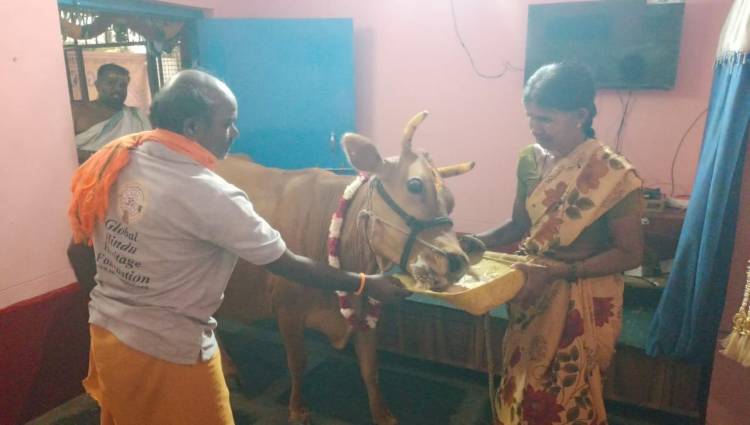[GHHF] Cow Puja for peace and tranquility in Society and receive the benefits of Pancha Gavya
 “May the Cows come to us, may they bring welfare, may they sit in our home, may they be satisfied with us. May they be plentiful in calves, in different forms, and in large numbers, may they be available for milking at Dawn for Indra.” Rig Veda 6:28:1
“May the Cows come to us, may they bring welfare, may they sit in our home, may they be satisfied with us. May they be plentiful in calves, in different forms, and in large numbers, may they be available for milking at Dawn for Indra.” Rig Veda 6:28:1
Global Hindu Heritage Foundation is extremely happy to inform that we conduct puja to cow every week in one of the villages where people of all castes come united to participate in Gau puja. Our priest will help all the attended to do puja by identifying different parts of cow and respective gods.
Why is Gau Puja Important?
Cows are a manifestation of the Mother Goddess Gau Mata. Hindus believe the cow to be a sacred animal, providing life-sustaining milk. This milk is considered the divine prasadam or holy offering, and on select festivals, she is decorated and worshiped. In India, the cow is worshipped as a god called ‘Gaumata,’ indicating its nourishing nature like a mother.
As per the legend, during Samudra Mantana, “Many gems, animal and gods emerged from ocean churning which took place between Gods and Demons. Kamadhenu, the divine also emerged during ocean churning which has the capacity to fulfil every desire. Once Kamadhenu reached the ashram of sage Vasishta. King Dilipan was childless. Hence, sage Vasishta advised him to worship Kamadhenu to obtain a child. The king started worshipping Kamadhenu and he was blessed with a child. Kamadhenu also helped sage Vashista in building up an army to fight a battle against Vishwamitra who wanted to take away Kamadhenu.”
Gau puja represents the worship of Goddess Kamadhenu, the Gomata. She fulfills all your wishes. Performing Gou Pooja can remove all negativity and bestow you with wealth, happiness, and prosperity in life. Cows help to remove poverty, by giving health, wealth and comfort. The worshipping cow may remove the deadliest sins. Worshipping cows helps to repay debts and to overcome enemies. Nearly 36 deities have taken abode in the body of a cow and hence it is a sin to harm it. The base of cow horns is an abode of Lord Brahma and Lord Vishnu. Lord Shiva resides in the forehead and Goddess Uma resides in the middle of the forehead. The nose is an abode of Lord Ganesh, and the nose tip is the abode of Murugan. Lord Yama resides in the heart; holy river Yamuna resides in cow dung while Goddess Lakshmi resides at the hind part of the cow. The sages, rishis reside in the hair of the cow and other gods reside at the base of the tail. As per our scriptures, 33 crore deities reside in cows
Ayurveda recommends Panchagavya to treat diseases of multiple systems, including severe conditions, with almost no side-effects. It can help build a healthy population, provide alternative sources of energy, complete nutritional requirements, eradicate poverty, pollution-free environment, organic farming, etc. Panchgavya can also give back to mother nature by promoting soil fertility, earthworm production, protecting crops from bacterial and fungal infections, etc. Scientific efforts shall be taken to build evidence for the clinical application of Cowpathy. The present review aims to summarize the health and medicinal benefits of Panchgavya.
Panchgavya represents milk, urine, dung, ghee, and curd, derived from cow and serves irreplaceable medicinal importance in Ayurveda and traditional Indian clinical practices. In Ayurveda, Panchgavya treatment is termed as ‘Cowpathy’.
Cow Dung Benefits
Each of the five cow products have health, agricultural and medicinal benefits. For example, the cow dung has the following benefits:
Medicinally, cow dung serves as antifungal, antibacterial, skin tonic, antimalarial, and anti TB. It increases vision. It also treats boils, rashes, psoriasis and eczema.
Donations are appreciated;
By Zelle: ghhfusaorg@gmail.com
PayPal: savetemples.org
By Check: You can also send a check payable to GHHF,14726 Harmony Lane, Frisco, TX 75035.
It is tax-deductible.
By Rupees: call 601-918-7111; +91 83096 43979























 Urgent support needed for Bangladesh Hindus
Urgent support needed for Bangladesh Hindus 







